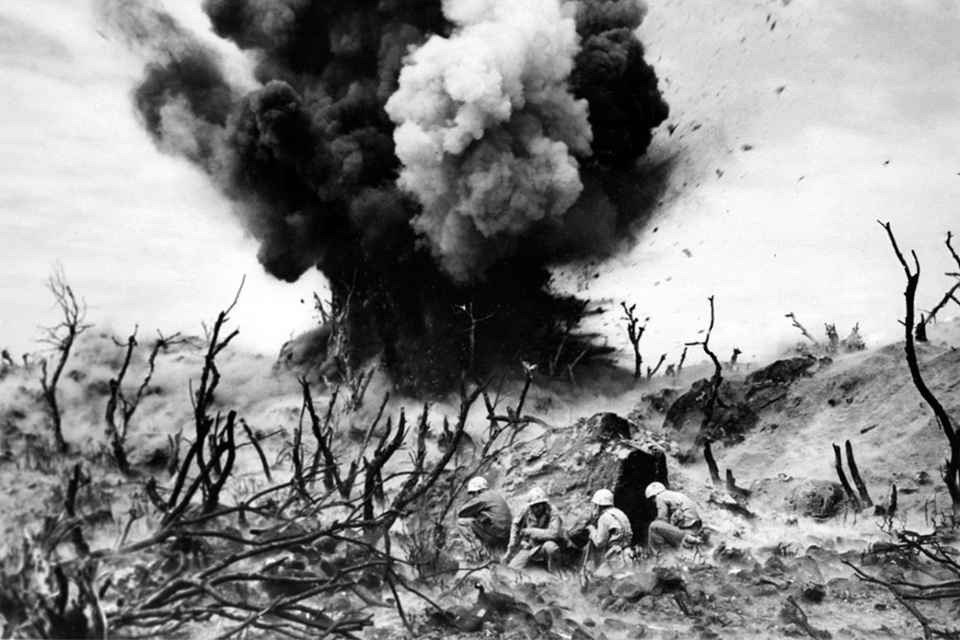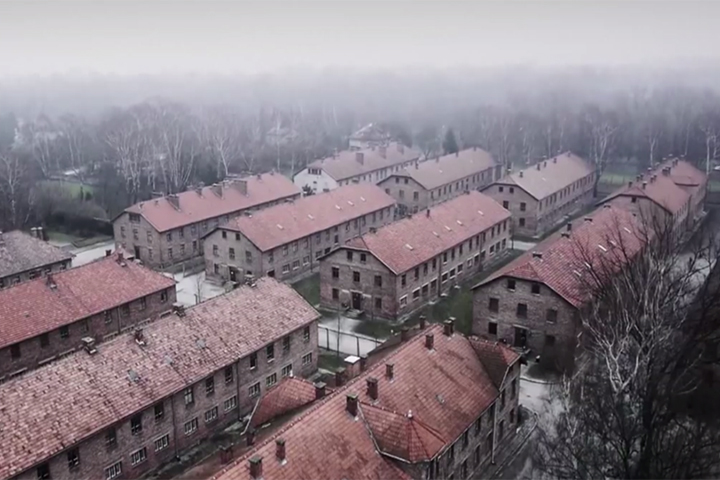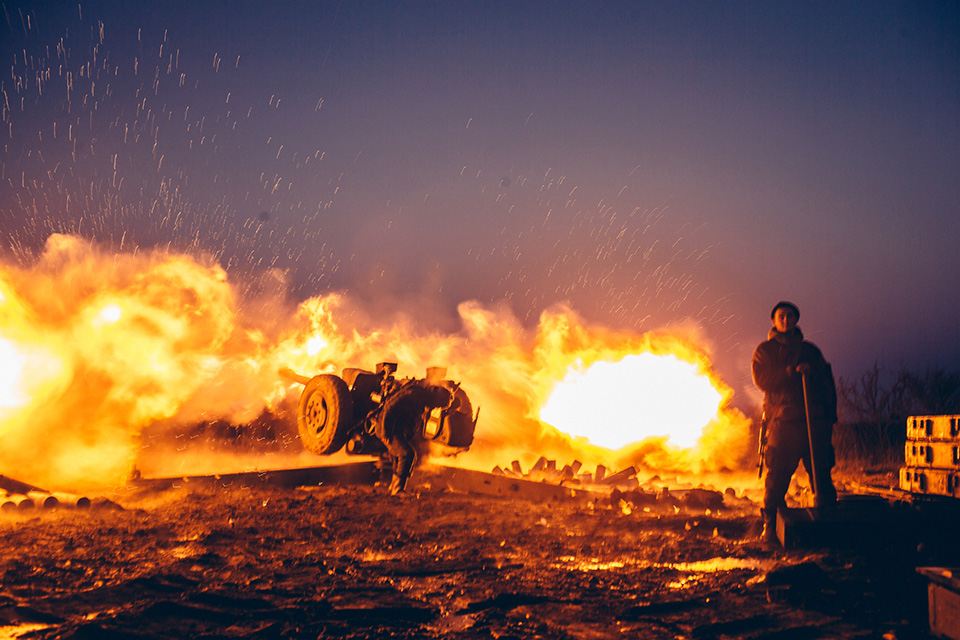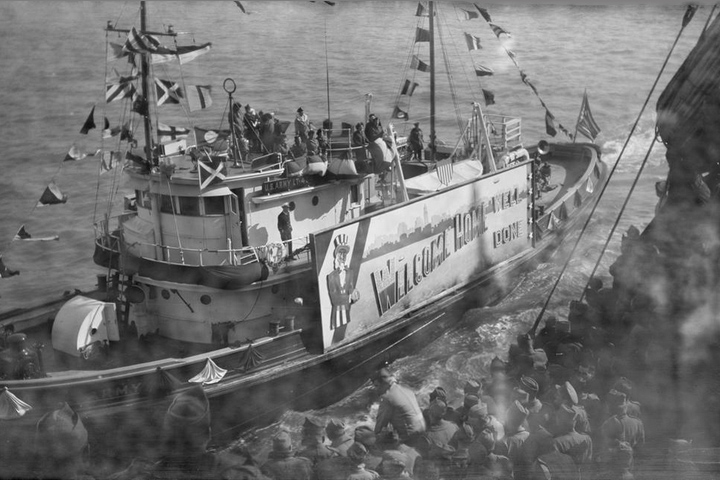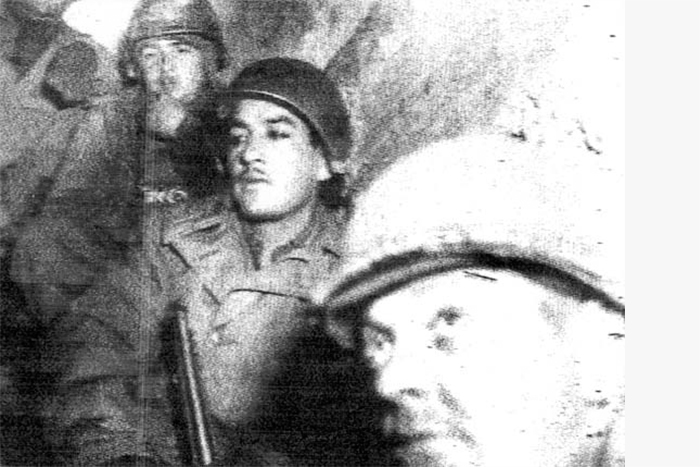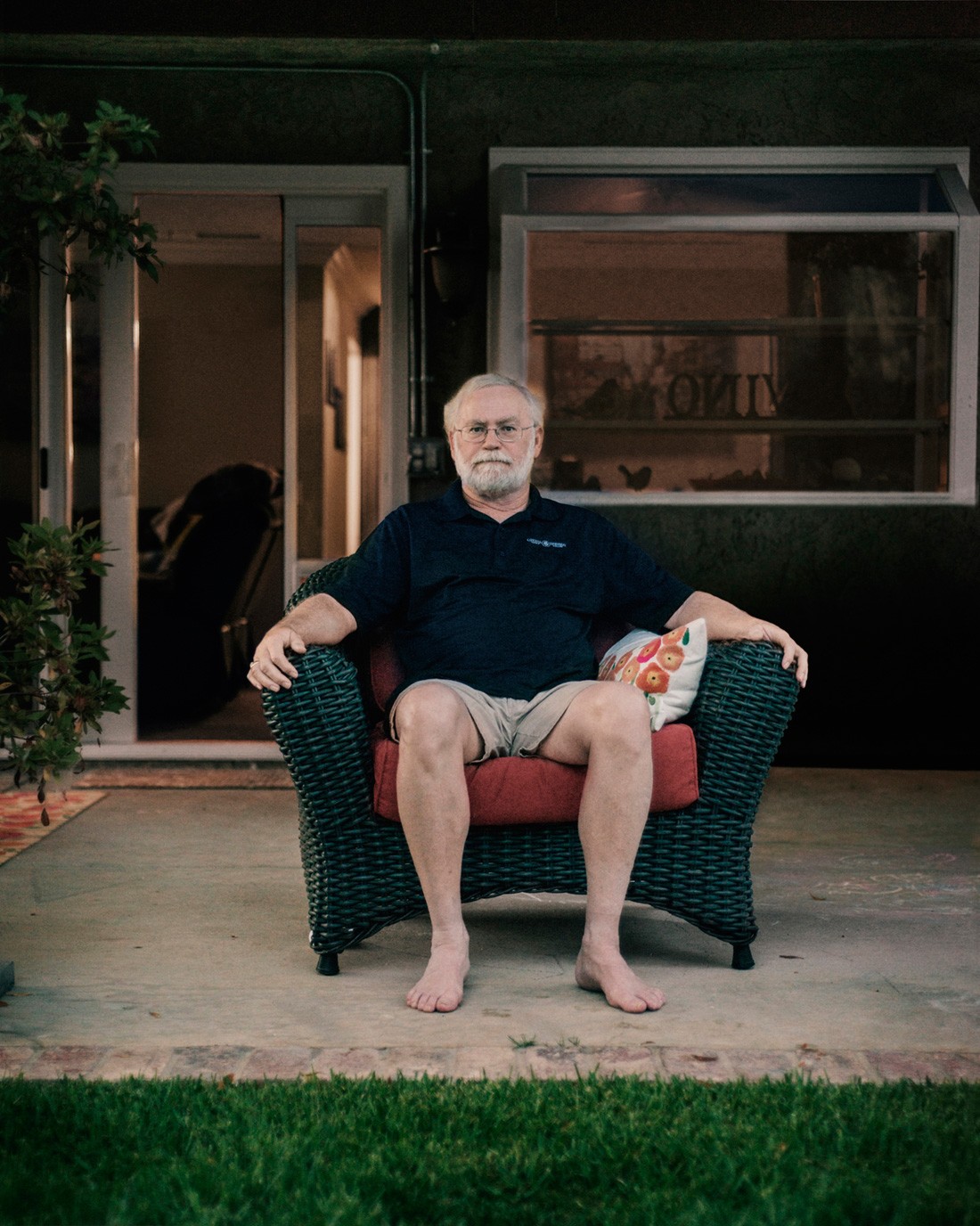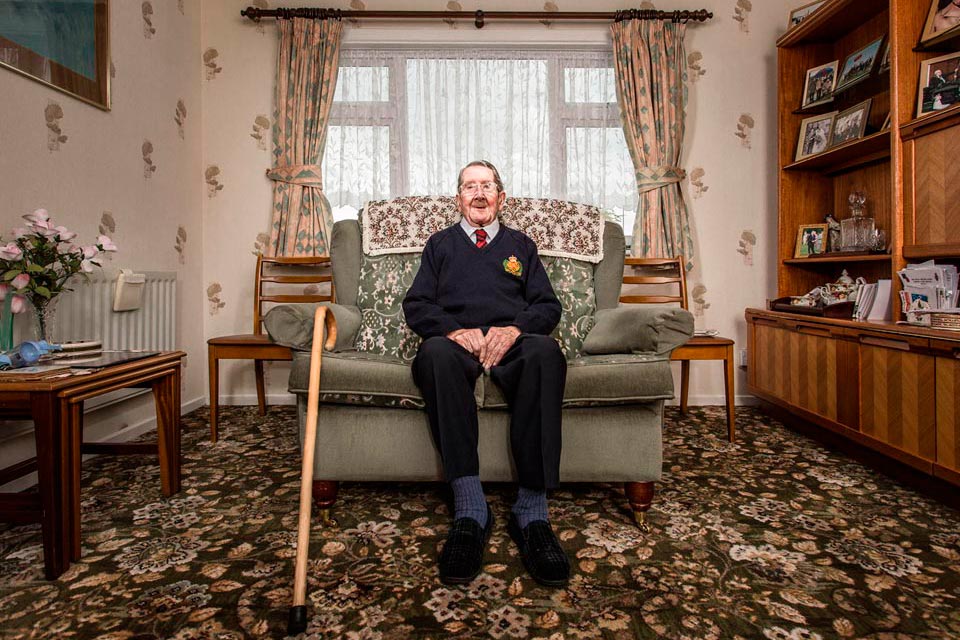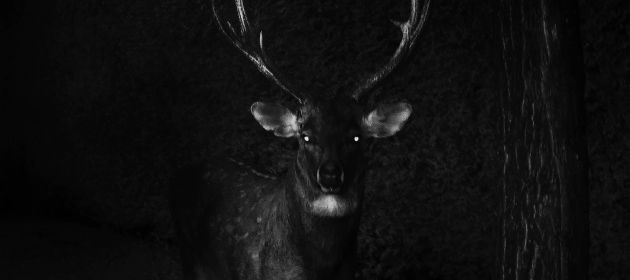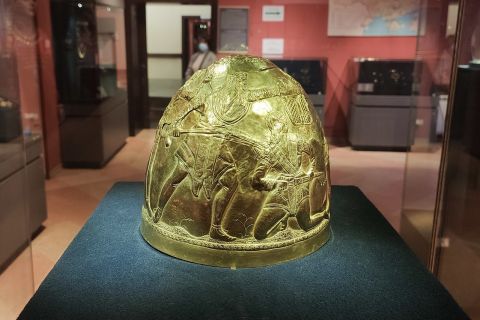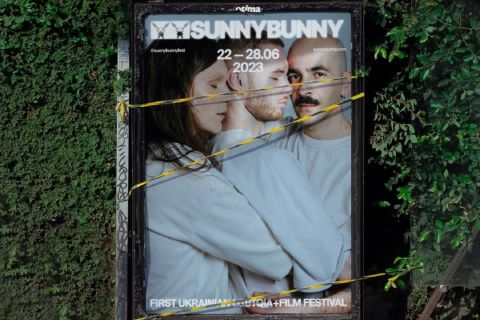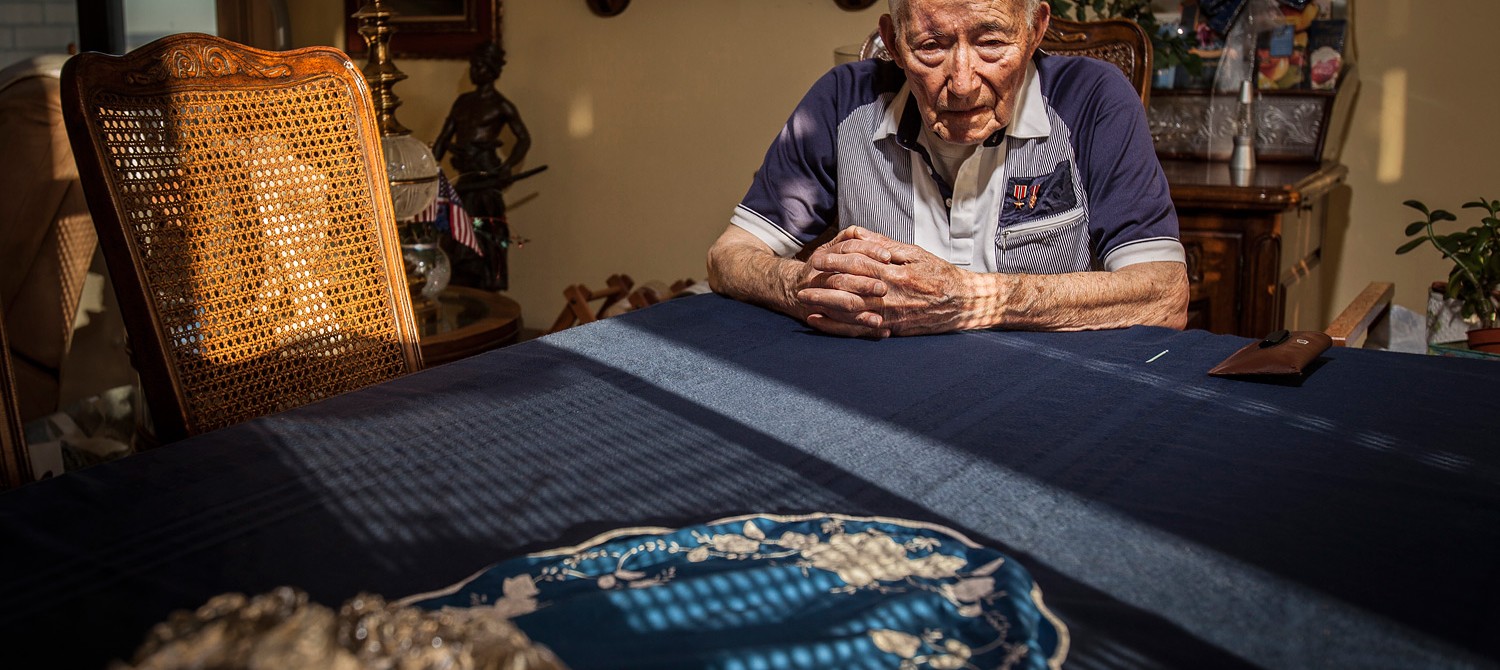
World War II Veterans in Sasha Maslov’s Project. Part II
On February 4, the Veterans exhibition of Ukraine-born American photographer Sasha Maslov opened in Port creative hub in Kyiv, Ukraine. The exhibition consists of 22 portraits and stories of people from different countries, who lived through WWII.
Bird In Flight is the main media partner of the exhibition. We are publishing some of the stories from Maslov’s project below. (See more stories in Part I.)
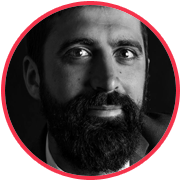
Ukrainian photographer, lives and works in New York. Works for The New York Times, Billboard, WWD, Wall Street Journal Magazine and other publications.
Imants Zeltins, Bauska (Latvia)
The beginning of my childhood was difficult after the First World War. My family had eventually managed to acquire some land. By 1939, we were doing very well. In 1938, we could afford a bicycle. We had no thoughts of going to war. In school, we were taught that Germany was our biggest enemy. But in 1940, when the Red Army occupied Latvia, that perspective shifted dramatically. When Germany attacked Russia on July 22, 1941, we thought they would be our liberators.
On May 1, 1943, I attempted to volunteer for the army. I was sixteen, so they didn’t take me. A general had us all in a line and said, “Those who are underage, step forward.” There were fifteen of us. They sent me back to Bauska. I found work in a police station. By then, Latvia was under German administration.
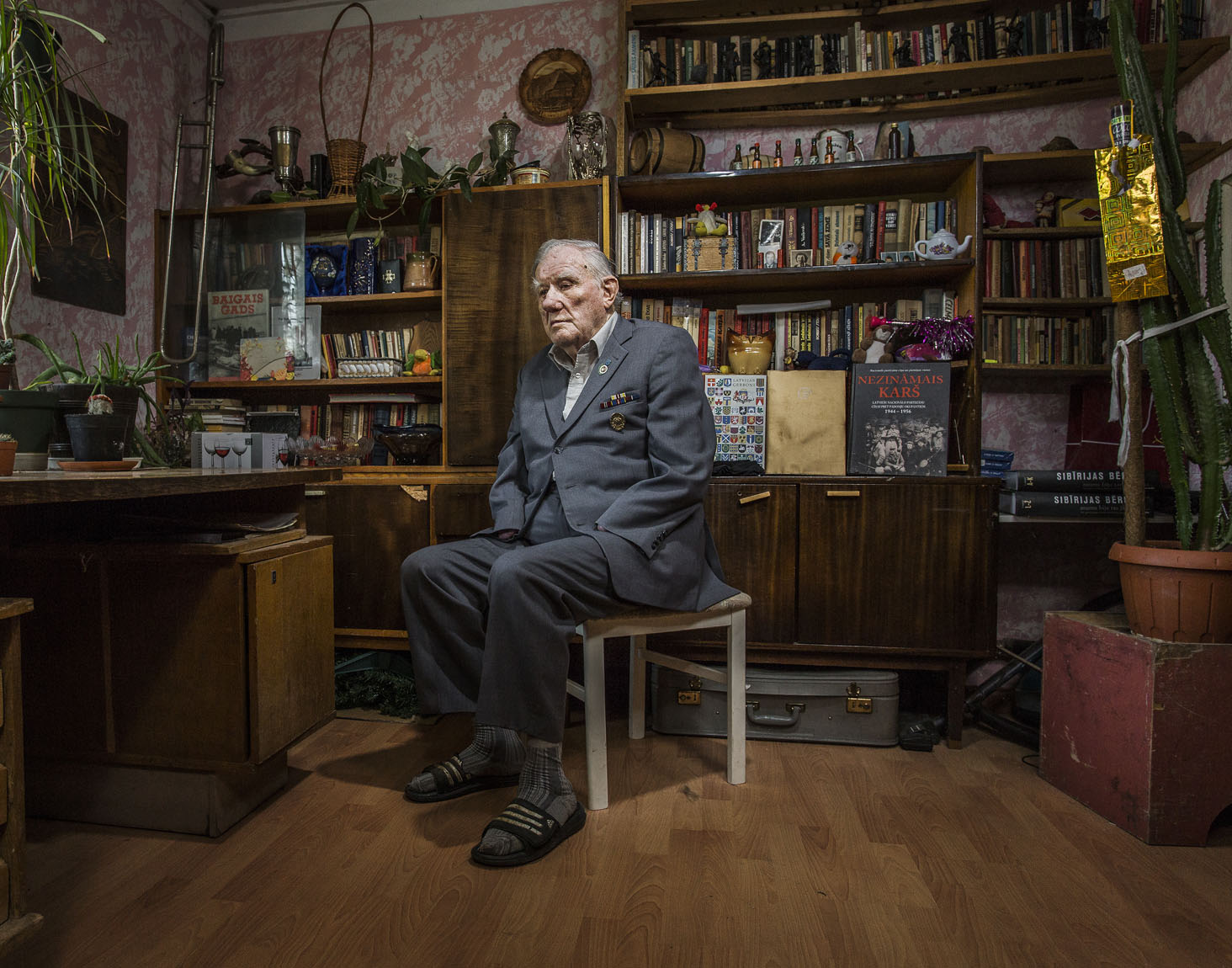
In 1944, the Red Army was pushing back and closing in on Bauska. On July 28 of the same year, I joined the volunteer force. I was finally eighteen. But there were people from fifteen years old to eighty years old, and everyone wanted to fight the Russians. No one wanted another Soviet occupation. We waged guerrilla war for several weeks.
I was injured on September 14, 1944. That’s where the war ended for me. I was injured in the fight where twenty-eight Soviet T-34 tanks went up against two hundred Latvian conscripts. We were trying to cross a river, but the Russians came at us from all sides. There were planes flying over, tanks on the ground, artillery fire. It was hell. Many men died trying to swim across the river. We had six mine throwers and all the men that knew how to use them were dead. I tried to use one from a rooftop, but a tank fired at the building and everything caved in beneath me. I was brought to a German hospital. My right arm was only attached by skin, so they cut it off. My left was completely smashed.
By February 1, 1945, the Americans had invaded Germany. The soldiers put signs on hospital doors that forbade patients from leaving the area. After a few days, all the Latvians there got together and literally cried, not because the war was ending, but because they knew Latvia would once again be occupied by the Russians.
On April 9, we were free to go. I knew a Latvian woman who had married a German. I went to see them and they gave me a room, but they were short on food. I stayed there until the Americans handed that territory over to the Russians. I no longer remember the name of the town we were in. I was eventually arrested for my participation in the resistance.
I was moved across different concentration camps in Germany, Poland, and Russia. Most of the people held alongside me ended up in Siberia, where they would remain for decades. I was the only one that didn’t go. I hadn’t done anything wrong. I told them if they thought I had, I wanted them to shoot me right away.
When I was free, I returned to my home, only to be mistaken for a vagrant by my mother before she realized who I was. After three days back in Bauska, I tried to get my documentation. But I was arrested and jailed for two weeks. They asked me for a list of names of all the people I worked with in the war. I gave them one and was let free. I still didn’t have documents, so I couldn’t find work. I yielded to failure and left Bauska. I married a woman in Riga. I found a job there as a security guard for different shops. When the boss discovered I hadn’t served in the Red Army, I was fired after only three months of employment. I couldn’t find another job. I started my own business and that’s how I earned money to raise my children.
Lidya Dolzhnikova, Kryvyi Rih (Ukraine)
I was born in the Kherson region, somewhere on a farm. My childhood was not that memorable. We worked a lot and I grew up with my mother and my brother. Of course, I remember the famine in 1933 and 1934. My little brother was bloated from hunger. So my mother took us to the seaside with her while she caught fish.
When the war started, we were in Crimea. My brother and I were very active from the beginning. I was only fourteen and my brother had just turned twelve. We dug trenches and dugouts around Ishun’, where the big defensive line at the entrance to Crimea was. The Germans were coming to us on land and we were doing everything possible to not let them through into Crimea.
But in the autumn of 1941, there was a horrific battle. The Germans broke through the defense line. So many of our soldiers were killed and drowned in the salt lakes that were around the trenches. It seemed like the water, the earth, and the skies were on fire. Our soldiers were falling left and right, and the Germans were just coming through, one tank after another, one motorcycle after another. I couldn’t see the end of it. How we didn’t die there I don’t know.
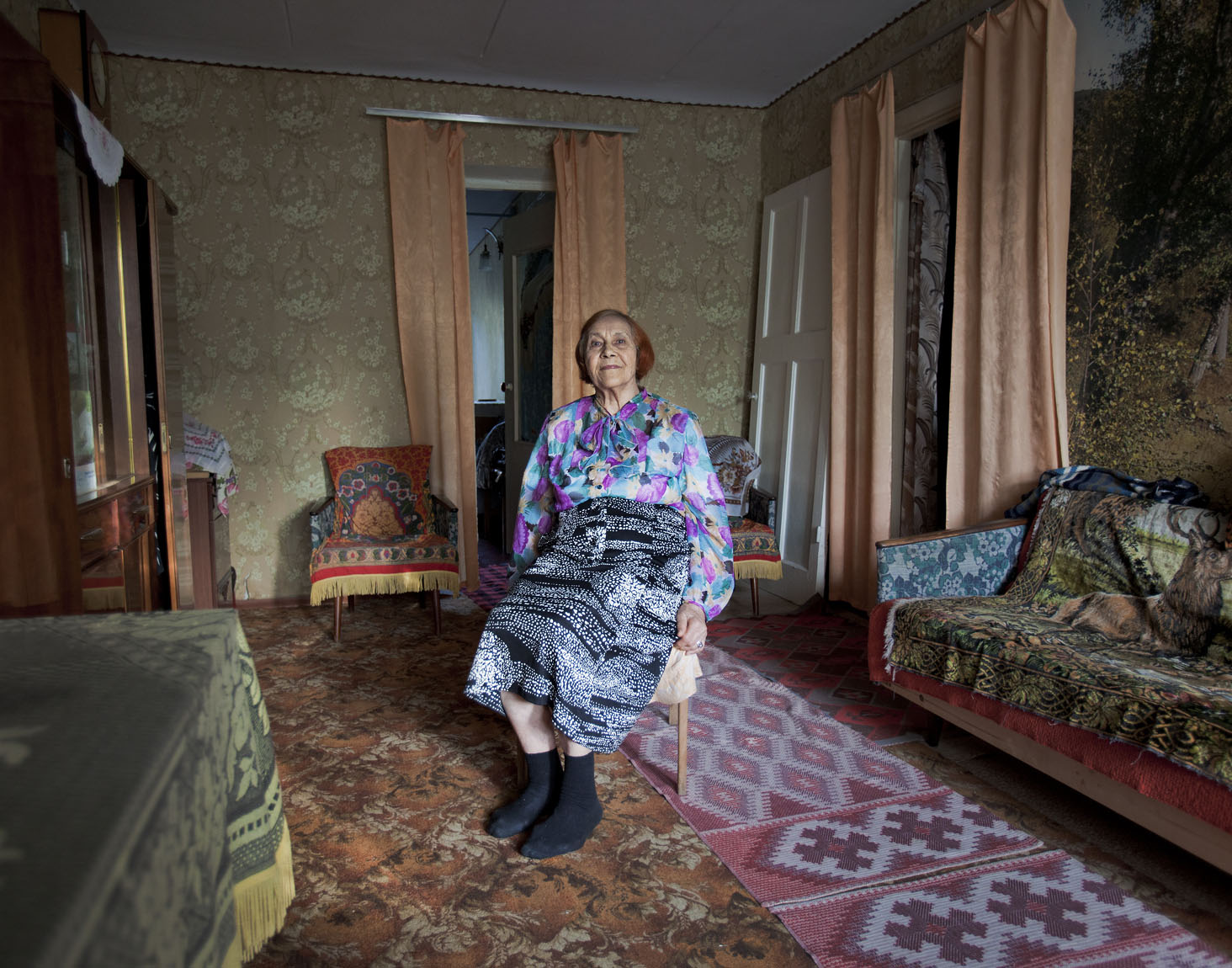
All the kids that were helping the soldiers there and managed to survive were taken to Ishun’. Meanwhile, the Germans were moving along the western coast of Crimea. They made it to Balaklava, where they won another battle, going all the way to Sevastopol.
Our soldiers took good care of me. Then our house was bombed and destroyed. We were moved to another place to live, where we stayed for the duration of the war. This was in a village called Pravda. We shared the house with another family. Then some Romanian soldiers who were coming through with the Germans took over the house. They made all of us live in the kitchen while they took the living room and the bedrooms. They would come to the kitchen and ask for food. They didn’t speak Russian so they would try to explain that they wanted some food. My mother said, “No food. I have my kids I have to feed not you.”
Life under German occupation was frightening. They started sending people back to Germany for work. We were lucky to avoid it — my brother had to hide in a chicken coop, or wherever he could, during raids. I was saved by an old woman who hid me in her stack of straw. I was a healthy young girl, and I was afraid of being taken to Germany. My mother poured acid on her shoulder, so every time Germans would try to take her, she would show them her shoulder and they’d leave her. They wanted to avoid any deformed or sick people.
Most people from that time are gone now. Crimea was different before the war — it was very diverse. After the war, the Germans escaped, the Estonians escaped. Jews were killed or escaped. The Tartars were displaced. There were very few people left. Then Russians settled here.
After the war, I studied at a technical school. After graduation, I worked as an electrician for a year. I was transferred here to Kryvyi Rih, where I worked in the coal mine for a while, as an electrician. Then I was transferred to the Factory of Mining Equipment, because I could get an apartment through work.
My husband had passed away by then. We had a son together, but we lost him when he was young. I live by myself now. My nephew lives nearby and helps out. There is a social worker that comes around and also helps. I need it sometimes. I have Parkinson’s disease.
Alexey Svyatogorov, Kharkiv (Ukraine)
We were in Luhansk in 1941 when the war broke out. I was at school. I had hardly finished my ninth grade year when our troops retreated and the Germans took Luhansk. It was in June 1942. The German vanguard detachments were the first to enter the city, followed by the Italians a couple of days later. So we had to discover what it is like to live under occupation.My father had cancer, so we could not be evacuated.
It was not long after my father’s funeral that I got arrested. It was a girl, who had a grudge against the Soviet state, who had betrayed us. They took us in November, and I was released only on February 14, when the Soviet troops finally took the city back.
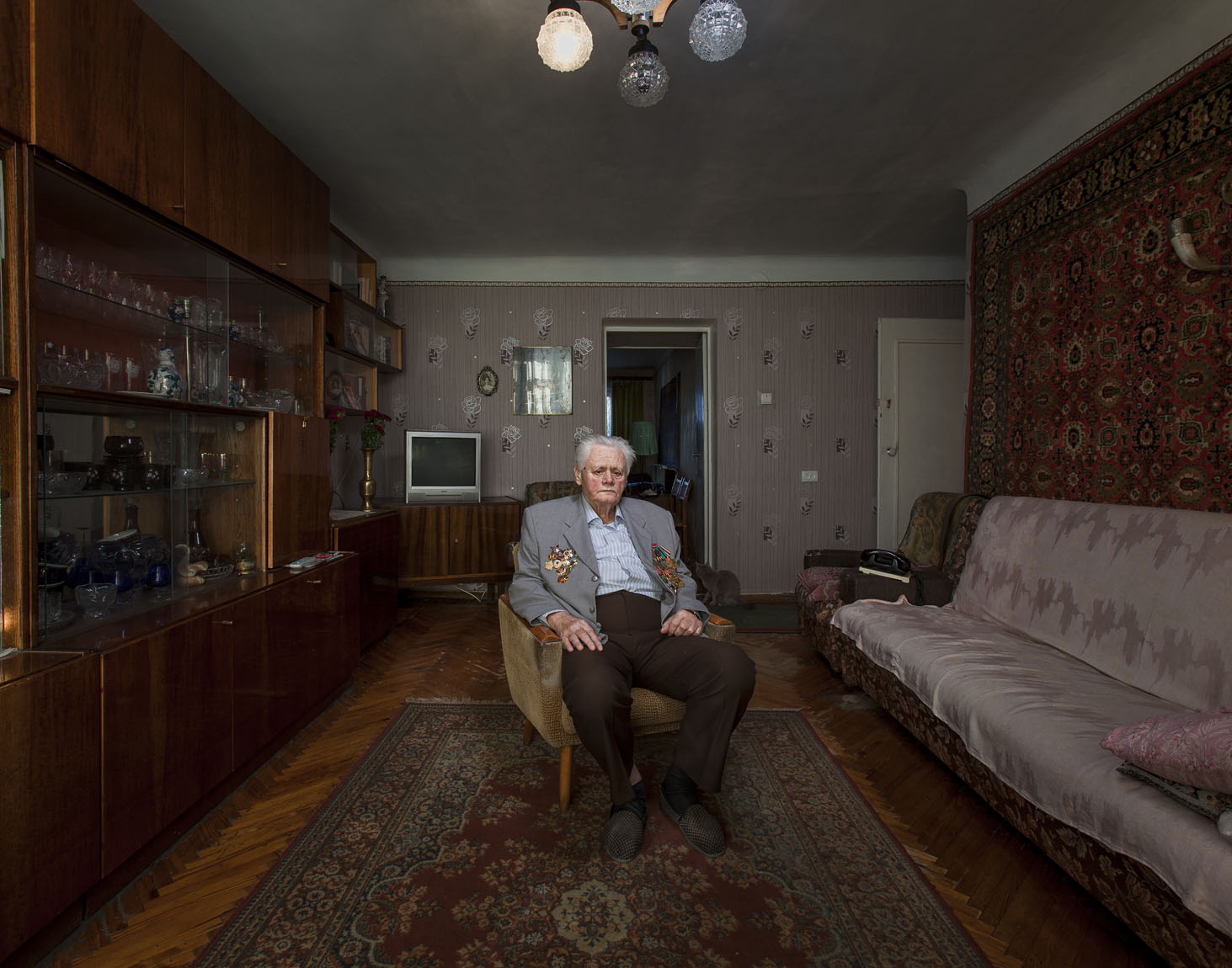
I was supposed to be drafted right after I got out, but I was too feeble and weak after the imprisonment. So they let me stay at home for some time and gain back my strength. In March, however, I was already in the army, in the 5th motorized infantry brigade that came from Stalingrad. I was trained as a mortar gunner.
I took part in the liberation of Ukraine all the way from Luhansk to Izmail. After Donbass we headed for Nikopol and crossed the Dnieper there. We went all the way through Romania, Bulgaria, Yugoslavia, Hungary, and Austria. I was awarded the Order for Bravery for liberating Kramatorsk and many other medals as well.
We were heading for Budapest, when suddenly, 200 kilometers away from the city, we received the order to turn left. We were sent to Pécs instead. It was night and I fell asleep. I had a dream as if I was standing near a truck disassembling my watch. Suddenly the mechanism fell out of my hands, but I managed to catch it just in time. I listened carefully and made sure that the watch was fine. I woke up and told the guys nearby that I was about to be either killed or wounded.
At that moment the Germans who were moving at a certain distance away from us decided to start a fight. By the time our trucks came closer, the battle was already in full swing. We stopped, and I was waiting for what was going to happen listening to the sound of bullets swishing under the truck. Suddenly I felt as if my head was torn away from my shoulders. I touched it making sure it was fine, then turned around and felt an awful pain in my chest. I suddenly stopped being afraid of the bullets and jumped into the ditch. There the guys took off my shirt and saw that a shell splinter, the length of a finger, went through my clothes and got stuck in the chest injuring the lung.
They took me to the medical unit. Funnily enough, it was the only shell that actually hit us. I was evacuated to a hospital in Timisoara. I stayed in the hospital from November 1944 till March 1945, which gave me plenty of time to get to know all the ins and outs of military bureaucracy. So when I was about to be discharged, I asked the girl who was in charge of issuing references and sick leaves, to give me a referral to my former unit. They gave me all the necessary papers, some money, clothes and a supply of food, and I set off to catch up to my unit.
Not long before the victory we had a major breakthrough towards Graz. I remember we were approaching the city when we saw the bright lights in the distance. We were sure that we were facing a head-on battle, the most dreadful thing that might happen to a motorized infantry unit. You can’t imagine how surprised we were when we came closer and saw that those were not headlights, but street lamps! We hadn’t seen any since 1941!
We were quartered at the outskirts of Graz. It was May 9, and we were planning to celebrate a birthday of a fellow soldier. So we set the table, gathered some food and drinks. We switched on the radio and heard the Moscow news saying that the 9th of May is Victory Day. I can’t describe to you the euphoria that overcame us. Several hours later, however, we had to move on further into the Alps, where some German units would not give up the fight. So we were in the war for another several days.
After the war, I stayed in the army for another five years. It turned out that it was not possible to organize a new recruitment, as there were no people available. It wasn’t until 1948 that they could finally make a new draft. So, I remained in the army, and in 1948 we were obliged to stay at the sergeants’ school to train young soldiers who had been drafted after the war. So it wasn’t until two years later, in 1950, that we were finally demobilized.
Jaakko Estola, Helsinki (Finland)
I was born in Finland after the civil war, in a time of great deprivation.
When the war with Russia began, all of my friends were drafted. Because of this, I then felt the need to join. I was rejected, because I was too skinny, but later proved myself to be fit enough in 1940. Up until the last minute, everyone was saying there wouldn’t be a war. Then it came. I can still remember the patriotic feeling that comes when you have to defend your country. I felt that I had to do something. I couldn’t remain there in the home front.
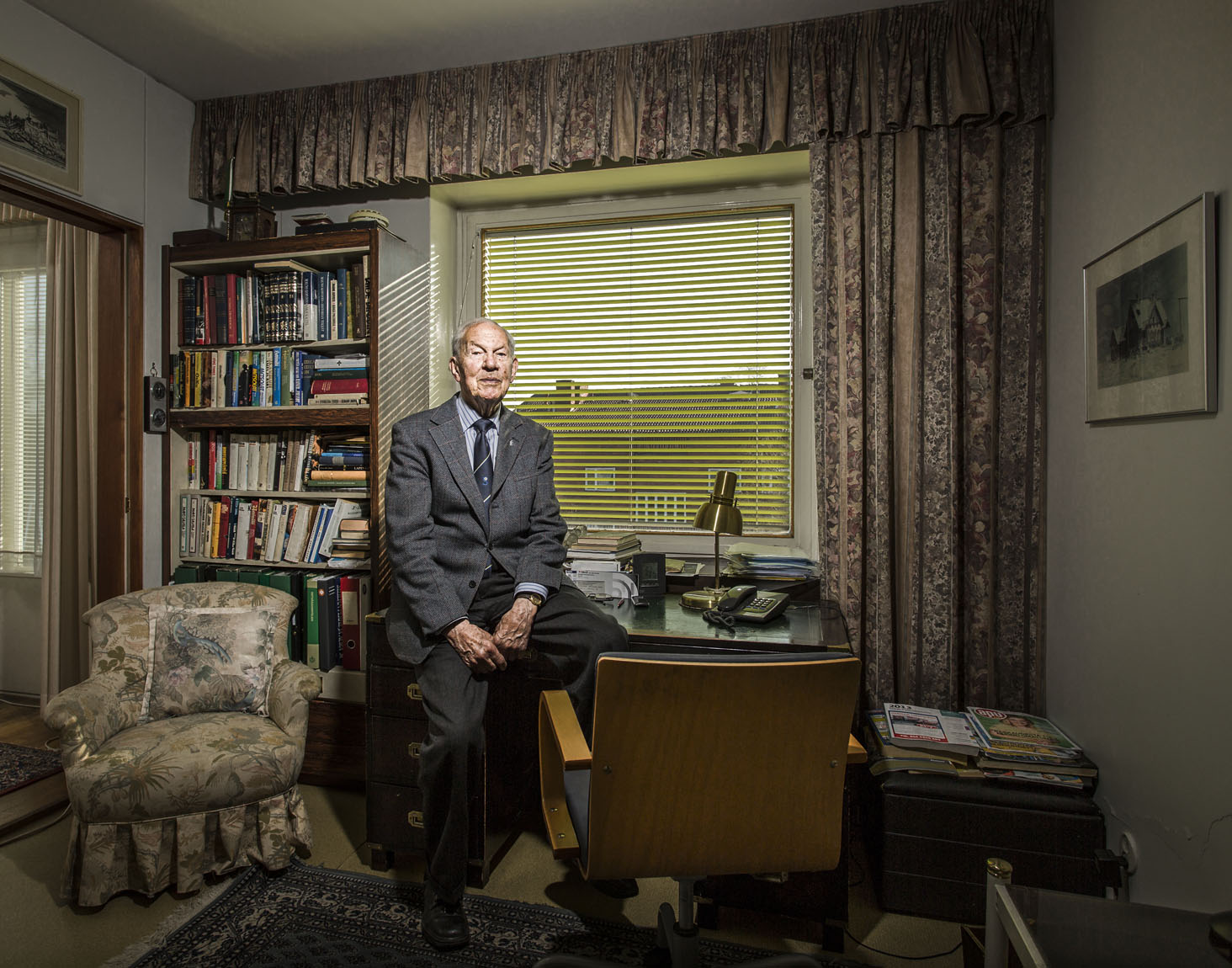
I was sent to a small town where the army had converted a school into a training camp. I went through ammunition and weapons training, but at the school we didn’t have any real weapons so we would chop wood and train with pretend ones. It was very poor training.
The following year I entered the war. I was stationed at the Finnish coast for two months. There were only two particularly exciting incidents that happened there. During one, we had to go through Russian territory and on the way back we took a break and found ourselves trapped in the crossfire between the two sides. Another time, some of us went to the front lines, south along the coast on bicycles. We turned back after coming across some of our own troops. We left along the same route and passed a pile of pine tree leaves. These were usually set to mark a salute or to signify danger. We continued on until someone yelled to us that the road was mined. I could have been blown so high I’d have seen the church towers of Leningrad.
In August, we were ordered to attack. By then the Russians had retreated to the old borders, where they had taken their positions and were ready. But as our tanks reached the river crossing, the soldiers began to retreat. This was a good feeling.
It was mostly peaceful on the southern front. Every so often Russian planes would fly over and harass us. It was very sandy there and we decided to go up on a dune and shoot down the next plane that flew over. When one got closer, we aimed our rifles. But it attacked us at the same time. We buried ourselves in the sand, attempting to hide. It was hard to see and the sand blew everywhere. A bomb fell several meters from where we were and a massive wall of sand washed over us. We were covered and it was very hot from the blast.
Toward the end of January in 1943, we formed a new brigade and traveled 700km into Russian territory by train. These were different circumstances. -20, -30°C. After only three days of fighting we lost seven hundred men to the weather. The next month, we were attacked at night. There was a full moon out and we were lying on the ground beneath enemy fire. I was staring at it and asking for help. But the moon was spiteful. I assume the moon wanted to kill us, to let us freeze in the ice.
On the morning of January 16, 1943, I was on my way to train at the base camp. This was after a heavy snow. I walked up to the barrier around the base and I was shot from a hundred meters out, where the enemy line was. I felt a wetness on my back. I fell with blood in my mouth, certain I’d been shot through the lung. But it turned out I was shot in the neck. Another bullet had gone by my spine and broken some of my ribs. Chips from the bones tore a large hole in my back. I received treatment over six months and was deemed fit to serve again, but they sent me back to Finland and I experienced the bombing of Helsinki by the Soviet Union in February 1944. But I don’t feel comfortable talking about that.
The rest of the time I served was peaceful and I was glad to give up my uniform and re-enter civilian life. The time of a young man was still in front of me. Still, after the war ended, I felt hollow. I wondered if this was finally peace. But because I soon turned my focus to studying, I didn’t have many global thoughts. I didn’t think about anything but rebuilding our country. I wasn’t happy about the defeat but I also wasn’t sad about it. Though there wasn’t much food, I was glad to be alive and healthy and surviving. That’s the term I would use: surviving.
Anatoliy Uvarov, St. Petersburg (Russia)
I was born in Moscow to a family of government workers. I wanted to either be a pilot or a sailor, so in 1940, after finishing 9 years of public school, I went to the naval school. I graduated exactly a week after the war broke out.
I was sent to Leningrad, which is now Saint Petersburg, to be trained in the Dzerzhinsky High Naval Engineering School. In summer of 1941, and I went through basic training. That autumn, the school had to be moved from Leningrad because the Germans were steadily approaching the city. We managed to move everything just days before the Siege of Leningrad began on September 8, to a town called Gorky, where Nizhny Novgorod is now.
We attended lectures and further training, but the number of students had been reduced by nearly 70% because many of the cadets had been sent off to the front, or had stayed behind in Leningrad to fight. Most of them died because they were basically a shield. About a million and a half kids who had just gotten out of school were killed within the first two months of the war. Some were my classmates.
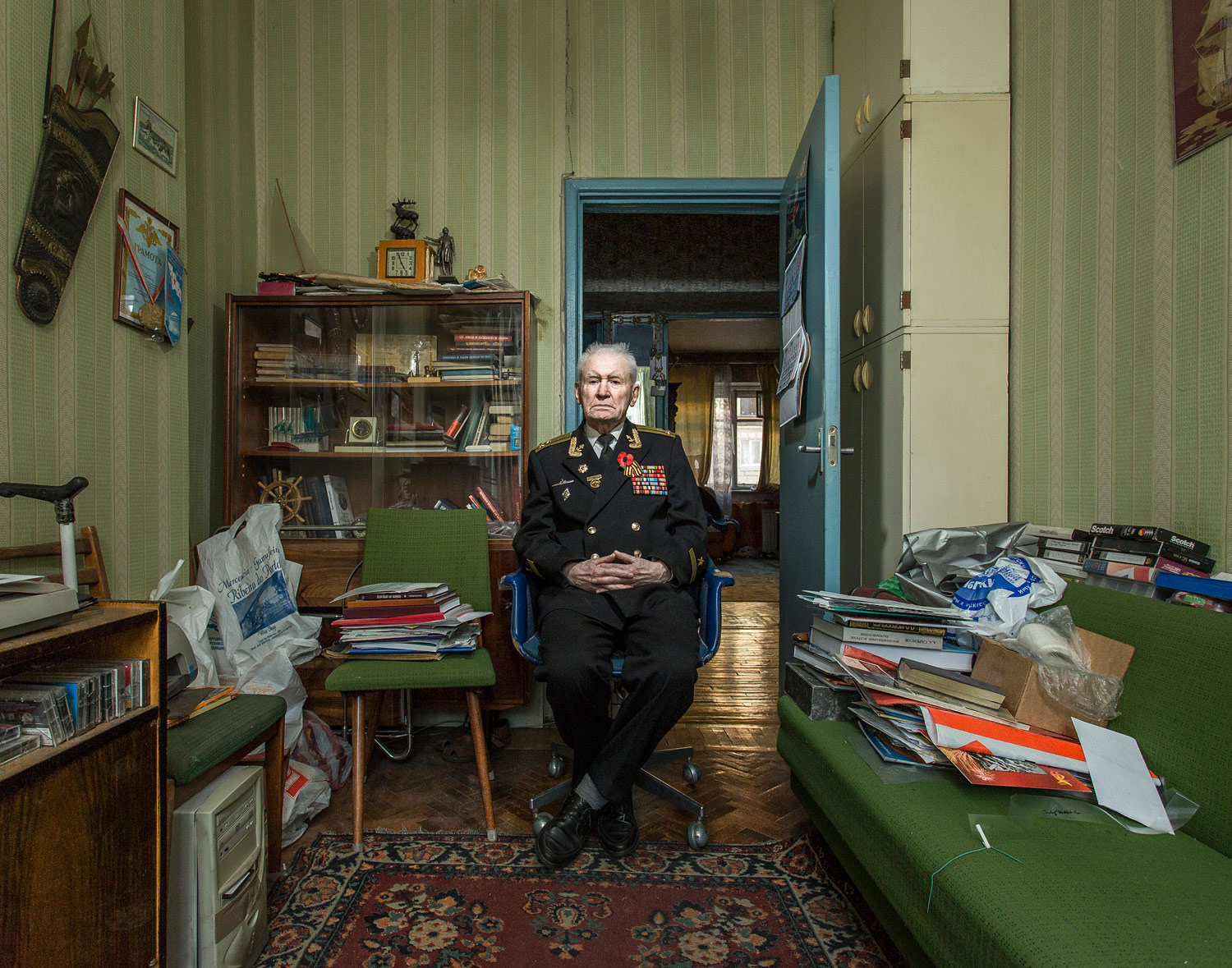
We trained on military ships in the summer. Even though it was wartime, my classmates and I attended our first naval training on the Caspian Flotilla in May 1942. This was especially active because there were a lot of Germans going through the Caucasus trying to get to Baku and capture oil rigs.
The oil traffic was busy. Tankers came from Baku and transferred oil to the smaller tankers that would go through the Volga River to the refineries, and the Germans learned this was happening. They began to bomb the transfer points. All of the Caspian facility was involved taking down German planes.
We were effective and active enough that the Germans were trying to bomb from higher altitudes, thus reducing their accuracy. I remember only one bombardment that reached a tanker. It was night and the oil had spilled and caught fire over the water. A terrifying scene. It looked like the sea was on fire. I could see people jumping from the flaming vessel. There was nowhere for them to go but the fire in the water.
I spent the summer of 1942 on this floating battery. Initially, we were defending the oil traffic. Later, we transported soldiers from Astrakhan to Makhachkala. The Germans were still approaching Baku and we tried to get more army personnel there.
We went to Astrakhan to pick up the soldiers. God, it was hot, so many mosquitoes you wouldn’t have known where to hide from them. We made eight trips because we could only take up to 500 people each time. Most of the soldiers came from Central Asia and barely spoke Russian. They were poorly dressed. Some didn’t even have shoes. But we needed to take as many as we could. It was nearly impossible to get through the deck, it was so full of soldiers.
Soon I returned to the academy and was there until the winter of 1943. I graduated in early 1944, and the following winter I was sent with the other cadets to join the Northern Fleet. I was sent to the town of Molotovsk, which is now Severodvinsk. The submarine was a beauty — new and large, with a powerful diesel engine, six torpedoes and a crew of around sixty people. I was appointed to the engine team, because I was formally educated in diesel engines. In October 1944, we embarked on our first combat mission, to Nordkapp, which is the northernmost point of Norway. This was a point of crossing for the Northern Convoys, a group of vessels that carried strategically necessary supplies to Murmansk and Arkhangelsk: food and various goods, military gear. These convoys were formed in various ports of Iceland and Scotland. Each would consist of fifteen to thirty vessels and would be guarded by few military ships until their destinations. German planes regularly attacked those convoys.
The day the war ended, I remember I was on night duty on the submarine. Everyone was asleep. I heard on the radio that Germany had surrendered, but I couldn’t celebrate with anyone because I wasn’t allowed to wake people up. I had to wait until morning, when I gave the signal to wake up the crew with a fife. Everyone was ecstatic. Someone started a pillow fight. We didn’t have much of a celebration. When we returned to the base, there was a fireworks show. We went to a small restaurant nearby, had a bottle of wine to warm up, then returned to base.
I was awarded with a medal, “For the Victory over Germany” and this happened during the Victory Parade in Moscow, on June 24, 1945. It was . . . something outstanding. An incredible parade that occurred just a month and a half after the war. I will never forget the day. It is something that’s stayed with me my entire life.
I learned English and can proudly say I achieved a good comprehension of the language. I’ve been to the United Kingdom a few times, meeting with my brothers in arms — people who took part in the Polar Convoys.
Harold Dinzes Passaic, New Jersey (USA)
In June 1942, my number got drafted. I was sent to Fort Belvoir, Virginia, to the engineering school. For some particular reason or another, I was interested in explosives. I took a liking to the instructor and paid attention to what was going on, eventually got the chance to go to officer candidate school and took it. Before I knew it, I was a second lieutenant.
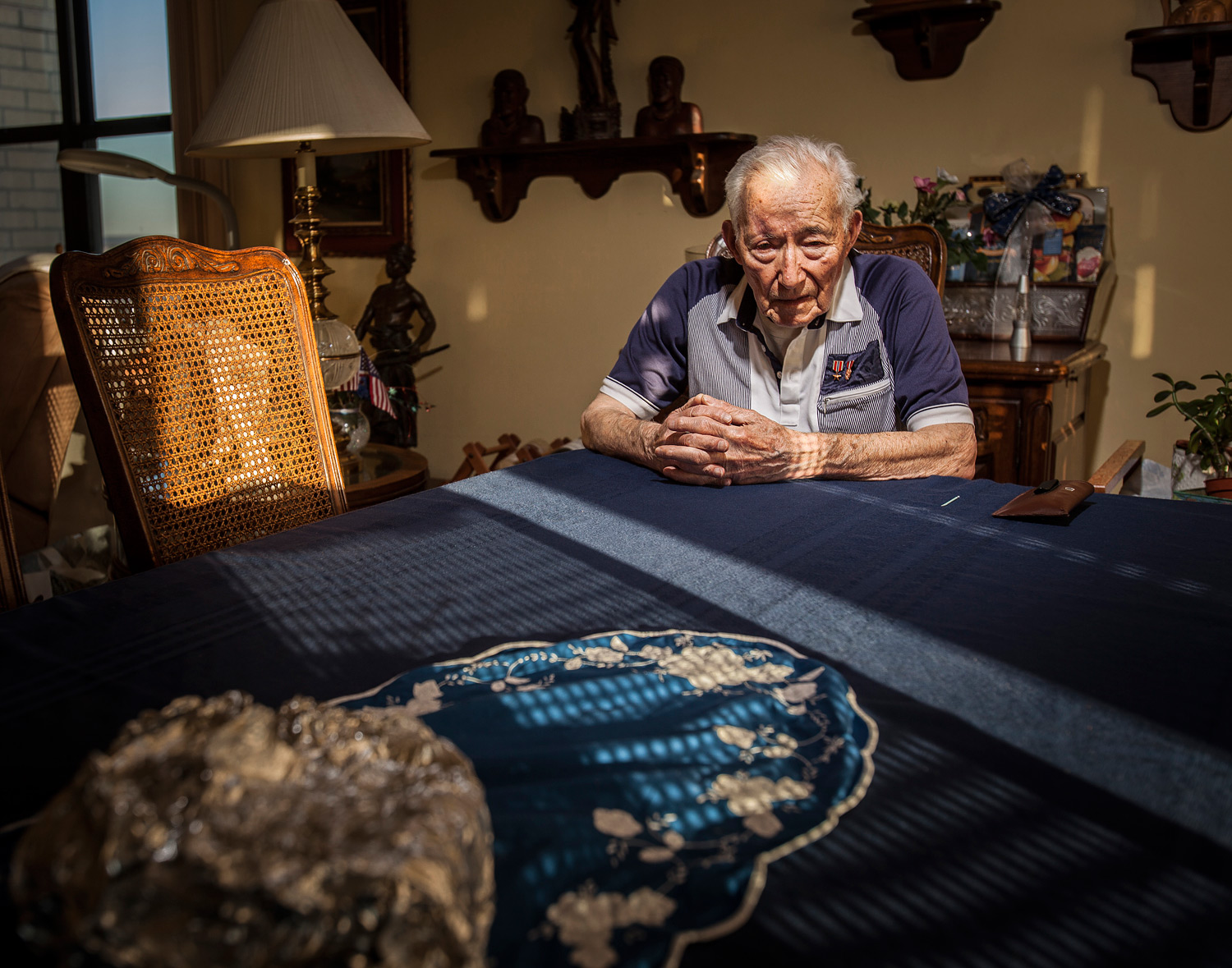
When I first got in the service, I started teaching about demolitions and booby traps. I went all over the country to different forts, camps, teaching and learning. Because I was good at what I was doing with explosives, I gave lectures to all the officers that were way up the line, including, once, a general. I taught everything I knew.
They shipped us overseas in 1943. We boarded the ship in San Francisco, if I’m not mistaken, and sailed across the Pacific in about three weeks, unescorted. Japanese subs were all over the place, but we didn’t use evasive tactics, we just went as fast as we could. On the way there, they told us we were going to New Guinea. There must have been, I’m guessing, eight thousand troops aboard that ship and I bet maybe ten people on the whole ship who knew where New Guinea was, or what it was.
We got put to work helping with the airfields that were in the process of being finished. At the time, I had about 166 men underneath me and I had to keep them fed with the rations we were getting from the service, as well as stuff we were getting from Australia. We never starved to death, but it wasn’t the kind of food you’d like to eat. To enhance the meals, we would do some fishing. With hand grenades. The fish would float up and the natives would tell you which ones you could eat. Soon, the fighting was going our way.
The Japanese had some very high class Marines who had previously seen combat, but they had to pull them out because we had the Australians there, who were also very good fighters. From that point on, it was the Japanese backing off from island to island, and you know what happened then, the history of the war. I can’t praise the Australians enough for the fighting that they did.
Anyway, there was a demand for aviation engineers to different places because we needed airfields badly. I got alerted. You got an alert, you have so much time to load up, get your equipment ready. They sent us off in a convoy, on a ten-thousand ton steamer. We went up the coast to Manila and I’ll never forget when we got to the harbor, which was a deep sea harbor where ships could come right up to the land. The whole bay was scattered with blown up ships, all you could see was the mast sticking up, a funnel here and there because it was a big ship.
I eventually got injured and got an infection in my ankle. I couldn’t get it fixed where I was, so I found an outfit nearby that had an army doctor. He gave me a concoction he himself created and it worked. He put a bandage over it and told me to keep my foot dry. But the minute I stepped out of the tent, there was water waist deep. You couldn’t keep it dry. It was impossible to do.
When the war was ending, I was at a field hospital. I had my bed on the veranda outside, because there was no room inside. There was a medical captain to my right and an eighteen-year-old from a Filipino combat outfit that had been fighting against the Japanese. The kid came running up to where we were one day, saying, “Captain, they just said on the radio they dropped a bomb equal to 15,000 tons of TNT.” I said, “Get the hell out of here. Go back to whatever you were doing and don’t come bothering me like that.” When I used TNT in the service, the most I ever used was ten or twenty pounds at a time. To blow up a bridge. To mine something. Set traps. This was an unheard of sum. He ran away, then he came back and said, “Sir, they’re saying it all over again on the radio.” So I went there. I didn’t know what the hell an atom bomb was. I couldn’t conceive of anything that powerful. Nothing like that had existed. It couldn’t be. But it was, of course.
Themistoklis Marinos, Athens (Greece)
I was born in Zakynthos in 1917. I finished my school in Zakynthos and then moved to Athens in order to study economics. To finance my studies I was also working odd jobs. When the Italians attacked Greece, I was called to arms and I thus stopped studying.
When war was declared we were very enthusiastic and we were looking forward to fighting against the invaders. The Germans and Italians took over Greece, and I left for Crete which was still free.
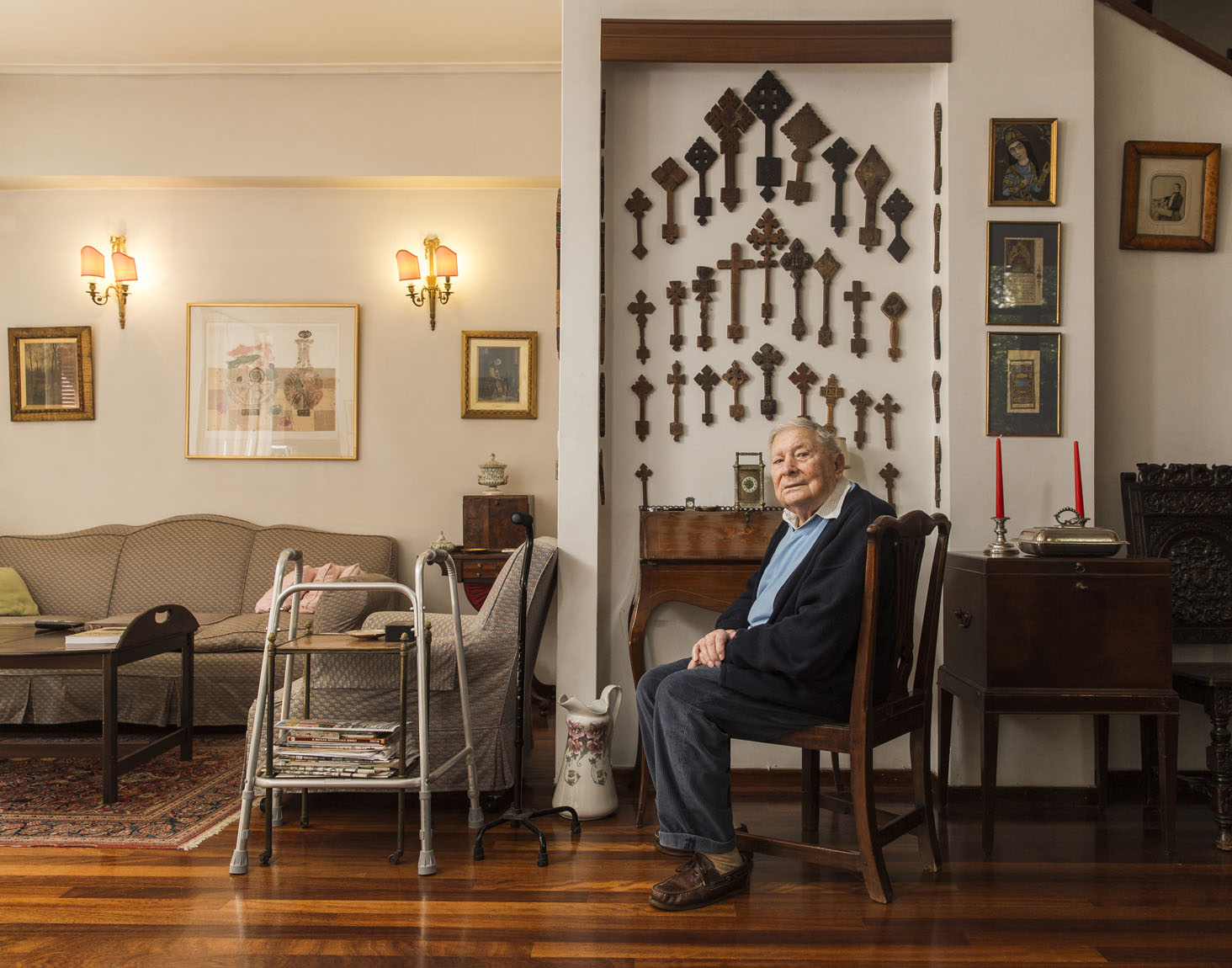
With no practical experience in the military, I took part in the Battle of Crete. The Germans attacked from the air on May 20, 1941. We fought alongside British soldiers and for a while we thought we were not going to let the Germans take over the island. But after 10 days and a lot of casualties on both sides, Crete was surrendered.
I had to flee to Cairo, where I joined the Greek Army again. I was an officer in a department that was the official linkage between the Greek and British Armies. During September 1942, before the battle of El Alamein, the General Office formed a group of soldiers in order to sabotage the Bridge of Gorgopotamos because the Germans were using it to supply weapons and provisions for the occupying troops. The group consisted of entirely British personnel and myself. I was the only Greek. It was one of the most important operations of the war for us because it managed to give hope to the Greek resistance.
After this incredible mission our group stayed in the area to support and train various guerrilla groups. In July 1943, when the Allied invasion of Sicily was about to take place, we were organizing some operations to trick the Germans into believing that the landings were going to take place here in Greece. Great battles took place in the western part of Greece, and the Germans were sending additional troops to strengthen their defenses instead of sending them to Italy.
One of the most memorable fights was the one that took place in the mountains of Makrynoros. Our group stopped a whole armored division that was heading to Sicily to support the Italian army during the invasion, and delayed them until its completion. During the battle I was calm and serene. In those cases you didn’t feel or think anything else other than how to succeed.
Already at that time we were in confrontation with Greek leftist resistance movements. They thought we were working for the Germans, but we knew they were getting help from the Soviet Union and wanted to establish a communist regime in Greece. One time I got caught by some partisans from the Greek People’s Liberation Army. Aris Velouchioti, the leader of ELAS, interrogated and tortured me himself for a whole night to make me claim that Fotios Zambaras, the leader of an opposite group, was cooperating with the Germans. He wanted me to say that so he could spread this false information. But I managed to escape. The moment I broke free was one of the happiest moments of my life.
At the end of 1943, I got back to Cairo. I was a trainer at the Secret Services Department. In April 1944, I was transferred to the General Headquarters located at Argostoli in Kefalonia. Through the Ionian Islands the Germans were controlling one of the main entrances to Peloponnesus and the mainland of Greece, and our main goal was to kick them out of there.
I came back to mainland Greece in the beginning of 1945. Greece was liberated from Germany, but the civil unrest was starting to boil over. Communists wanted to take over power. And soon, with the help of the newly created Communist governments in Bulgaria and Yugoslavia, the Greek communists started a civil war. But that’s a different story.
After the Greek Civil War, I tried to work various jobs but then decided to finish my studies that were interrupted due to the war. So I enrolled at the London School of Economics for a master’s degree. When I finished my postgraduate studies, I worked both in Greece and abroad at the World Bank, at the United Nations and for other organizations. I also got married to my wife whom I had met in Bulgaria where she was a cipher officer.
